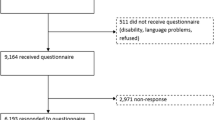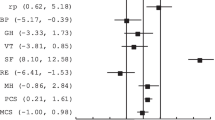Abstract
Scaling assumptions and validity of the English (UK) and Chinese (HK) short form 36 health survey (SF-36) were assessed in a community-based survey of 5503 Chinese, Malays and Indians in Singapore using the international quality of life assessment project approach of item and scale level validation. Missing data for SF-36 items and scales occurred in less than 1.0% of subjects. Item level validation of both versions generally supported assumptions underlying Likert scoring and hypothesised item-order clustering. Item level factor analysis supported the eight-scale structure of the SF-36. In scale level validation, SF-36 scale scores showed wide variability and acceptable internal-consistency reliability (Cronbach's α > 0.70 for six English and seven Chinese scales), conformed to hypothesised patterns and generally varied according to hypotheses in subjects known to differ in quality of life. Scale level factor analysis of both versions yielded very similar patterns of factor correlation, comparable to that found in Japan, but differing from that seen in Western populations. Taken together, these results support the validity of the English (UK) and Chinese (HK) SF-36 versions in the multi-ethnic Asian socio-cultural context of Singapore.
Similar content being viewed by others

References
Ware JE, Sherbourne CD. The MOS 36-item short form health survey (SF-36) I: Conceptual framework and item selection Med Care 1991; 30: 473-483.
McHorney C, Ware JEJ, Raczek A. The MOS 36-item short-form health survey (SF-36): II. Psychometric and clinical tests of validity in measuring physical and mental health constructs. Med Care 1993; 31: 247-263.
McHorney C, Ware JEJ, Lu J, Sherbourne C. The MOS 36-item short-form health survey (SF-36): III. Tests of data quality, scaling assumptions, and reliability across diverse patient groups. Med Care 1994; 32: 40-66.
Manocchia M, Bayliss MS, Conner J. F-36 Health Survey Annotated Bibliography. Boston: Health Assessment Lab, New England Medical Center, 1996.
Ware JE, Gandek B. Overview of the SF-36 health survey and the international quality of life assessment project. J Clin Epidemiol 1998; 51: 903-912.
Ware JE Jr, Keller SD, Gandek B, Brazier JE, Sullivan M. Evaluating translations of health status questionnaires. Methods from the IQOLA project. International Quality of Life Assessment. Int J Technol Assess Health Care 1995; 11: 525-551.
Lau KE. Singapore Census of Population 1990: Literacy, Languages Spoken and Education: Statistical Release 3. Singapore: Department of Statistics, 1993.
Thumboo J, Fong KY, Ng TP, et al. Validation of the MOS SF-36 for quality of life assessment of systemic lupus erythematosus patients in Singapore. J Rheumatol 1999; 26: 97-102.
Thumboo J, Feng PH, Soh CH, Boey ML, Thio ST, Fong KY. Validation of the Chinese SF-36 for quality of life assessment in patients with systemic lupus erythematosus. Lupus 2000; 9: 708-712.
Ware JE. SF-36 Health Survey: Manual and Interpretation Guide, 1993. Boston: The Health Institute, New England Medical Center, 3: 20-21.
Lam CL, Gandek B, Ren XS, Chan MS. Tests of scaling assumptions and construct validity of the Chinese (HK) version of the SF-36 health survey. J Clin Epidemiol 1998; 51: 1139-1147.
Wagner AK, Gandek B, Aaronson NK, et al. Cross cultural comparisons of the content of SF-36 translations across 10 countries: Results from the international quality of life assessment project. J Clin Epidemiol 1998; 51: 925-932.
Ware JE, Gandek B. Methods for testing data quality, scaling assumptions, and reliability: The IQOLA project approach. J Clin Epidemiol 1998; 51: 945-952.
Ware JE, Gandek B. Methods for validating and norming translations of health status questionnaires: The IQOLA project approach. J Clin Epidemiol 1998; 51: 953-959.
Bland JM, Altman DG. Statistics Notes: Cronbach's alpha. Br Med J 1997; 314: 572.
Ware JE Jr, Kosinski M, Gandek B, et al. The factor structure of the SF-36 Health Survey in 10 countries: Results from the IQOLA Project. International quality of life assessment. J Clin Epidemiol 1998; 51: 1159-1165.
Sharma S. Applied Multivariate Techniques. New York: John Wiley and Sons, 1996; 90-143.
Brazier J, Harper R, Jones N, et al. Validating the SF-36 health survey questionnaire: New outcome measure for primary care. Br Med J 1992; 305: 160-164.
Sullivan M, Karlsson J. The Swedish SF-36 Health Survey III. Evaluation of criterion-based validity: Results from normative population. J Clin Epidemiol 1998; 51: 1105-1113.
Johnson P, Goldman L, Orav E, Garcia T, Pearson S, Lee T. Comparison of the medical outcomes study short-form 36-item health survey in black patients and white patients with acute chest pain. Med Care 1995; 33: 145-160.
Garratt AM, Ruta DA, Abdalla MI, Buckingham JK, Russell IT. The SF-36 health survey questionnaire: An outcome measure suitable for routine used within the NHS? Br Med J 1993; 306: 1440-1444.
Gandek B, Ware JE, Aaronson NK, et al. Tests of data quality, scaling assumptions, and reliability of the SF-36 in eleven countries: Results from the IQOLA project. J Clin Epidemiol 1998; 51: 1149-1158.
Chang DF, Chun CA, Takeuchi DT, Shen H. SF-36 Health Survey. Tests of data quality, scaling assumptions and reliability in a community sample of Chinese Americans. Med Care 2000; 38: 542-548.
Keller SD, Ware JE, Bentler PM, et al. Use of structural equation modeling to test the construct validity of the SF-36 health survey in ten countries: Results from the IQOLA project. J Clin Epidemiol 1998; 51: 1179-1188.
Mook J, Kleijn WC, van-de-ploeg HM. Symptom positively and negatively worded items in two popular self report inventories of anxiety and depression. Psychological reports 1991; 69: 551-560.
Rummel RJ. Applied Factor Analysis. Chicago: Northwest University Press. 1970; 369.
Ware JE, Gandek B, Kosinski M, et al. The equivalence of SF-36 summary health scores estimated using standard and country-specific algorithms in 10 countries: Results from the IQOLA Project. J Clin Epidemiol 1998; 51: 1167-1170.
Fukuhara S, Ware JE Jr, Kosinski M, Wada S, Gandek B. Psychometric and clinical tests of validity of the Japanese SF-36 Health Survey. J Clin Epidemiol 1998; 51: 1045-1153.
Johnson PA, Goldman L, Orav EJ, Garcia T, Pearson SD, Lee TH. Comparison of the Medical Outcomes Study short-form 36-item health survey in black patients and white patients with acute chest pain. Med Care 1995; 33: 145-160.
Corporate Author. Singapore in Figures, 1998. Singapore: Department of Statistics, 1998.
Author information
Authors and Affiliations
Rights and permissions
About this article
Cite this article
Thumboo, J., Fong, K.Y., Machin, D. et al. A community-based study of scaling assumptions and construct validity of the English (UK) and Chinese (HK) SF-36 in Singapore. Qual Life Res 10, 175–188 (2001). https://doi.org/10.1023/A:1016701514299
Issue Date:
DOI: https://doi.org/10.1023/A:1016701514299



